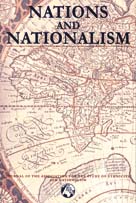Article contents
The immemorial Iranian nation? School textbooks and historical memory in post-revolutionary Iran
Published online by Cambridge University Press: 01 January 2000
Abstract
This paper is concerned with the fortunes of the pre-revolutionary, Pahlavi nationalist narrative in post-revolutionary Iran. The study analyses and compares pre- and post-revolutionary school textbooks with the aim of demonstrating that, for all its revolutionary and Islamic-universalist hyperbole, the Islamic Republic of Iran remained committed to the Pahlavi dynasty's conception of the ‘immemorial Iranian nation’ (or the ‘Aryan hypothesis’) as it was first articulated by European scholars of the late nineteenth and early twentieth centuries. Post-revolutionary Iran clung to the European/Pahlavi master narrative of Iranian history, its very basic ‘story line’. It was, therefore, subject to the same evolution, the same dialectic of remembering and forgetting, the same successive deformations, and the vulnerability to the very same manipulation and appropriation. This study, then, attempts to establish that the Islamic Republic's apparent shift from ‘Iran Time’ to ‘Islam Time’, though it reaches far beyond Iranian borders, nevertheless remains wedded to, and embedded in, the dominant European, secular traditions of the Pahlavi era. Islamic consciousness in Iran does not in any way constitute the basis for an alternative myth to the national myth. Rather, it adds Islamic terminology to the very same myth. Political Islam thus remains within the confines of Iranian nationalism. It is articulated in the framework of the symbols of Iranian nationalism, endowing them with a meaning that is supposedly religious.
- Type
- Research Article
- Information
- Copyright
- © 2000 Association for the Study of Ethnicity and Nationalism
- 28
- Cited by




